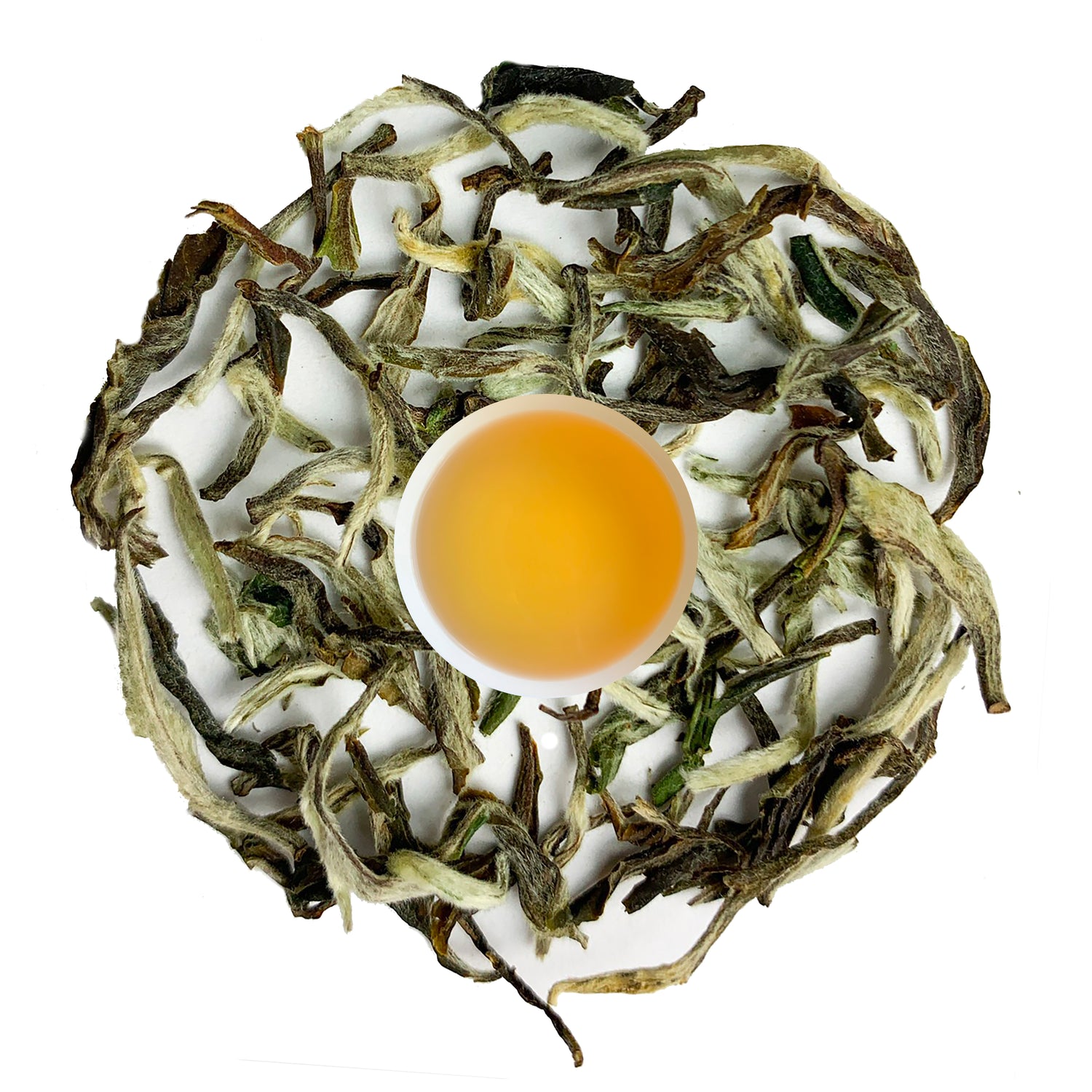
White Tea and Caffeine: What You Need to Know
For centuries, tea has been consumed and today, it ranks as the second most consumed beverage in the world, just after water. Alongside the exceptional health benefits, another key reason for its popularity is its wide range of varieties which provide options for selecting from different flavors. Among the numerous types of tea, recently, white tea has gained popularity for its delicate flavor.
Because white tea has a light, delicate flavor, many people are often curious about its caffeine content. If you have this question, then this blog is for you. We will look into the facts about the caffeine content in white tea. Additionally, we will also explore the benefits and drawbacks of white tea’s caffeine content.
To better understand the caffeine content in white tea, it's important to first understand what white tea is. So, let’s begin with the basic information about white tea.
What is white tea?
White tea is a type of tea that comes from the Camellia Sinensis plant, the same plant that produces green, black, and oolong teas. What makes white tea unique is its minimal processing and the early stage at which the leaves are harvested. The leaves and buds are picked just before they are fully open when they are still covered in fine white hairs, which is how it gets its name.
White tea is known for its light, delicate flavor profile compared to more heavily processed teas. It is the least processed of all teas. After harvesting, the leaves are quickly dried, which helps keep their fresh, subtle flavors and natural antioxidants. This gentle processing method also means white tea retains a high amount of nutrients, making it a popular choice for tea lovers and health enthusiasts alike.
Due to its mild flavor and low caffeine content, white tea is an excellent choice for those who are sensitive to stronger teas. It's often appreciated on its own without any sweeteners or flavorings to enjoy its natural taste.
What is caffeine?
Caffeine is a natural stimulant found in the seeds, leaves, and fruits of some plants, including the Camellia Sinensis plant. When consumed, it stimulates your central nervous system by blocking the action of adenosine neurotransmitters which leads to increased alertness and energy. Moreover, caffeine also offers numerous physical health benefits including lowering the risk for serious health issues such as diabetes, heart disease, Parkinson’s disease, and Alzheimer's disease.
While caffeine offers excellent health benefits, it is also important to note that it has negative impacts too, especially upon over-consumption. Some people may experience jitters, anxiety, or difficulty sleeping after consuming too much caffeine.
How much caffeine is in white tea?
It varies. For instance, a type of white tea called white peony has a bit more caffeine than the very delicate Silver Needle. Generally, an 8-ounce cup has about 30 to 35 milligrams of caffeine.
Therefore, caffeine levels in white tea are relatively low if you compare it to other teas, which makes it the best choice for those tea enthusiasts who love their tea to be minimally caffeinated.
What influences caffeine level?
It depends on numerous factors. So, you must keep those factors in mind while brewing and consuming white tea, if you are concerned about your caffeine intake. Let’s find out different factors that influence the caffeine content in white tea.
Age and Quality of Tea Leaves
One of the primary factors is tea production. White tea prepared from younger leaves is likely to contain more caffeine than those with older leaves. This is because younger tea buds store additional caffeine to use as a natural protective shield against insects. Additionally, the quality of the tea leaves also impacts the caffeine content. The white tea produced using the highest quality leaves has more caffeine content than others.
Place of Tea Cultivation
The location, temperature, soil type, altitude, and climate of the tea cultivation also impact the caffeine in white tea. For instance, white tea cultivated in high altitudes with low temperatures and minimum rainfalls will be high in caffeine content. This is because such growing conditions cause stress in the tea plant and it produces more caffeine to form a shield to survive in the difficult conditions. On the other hand, tea cultivated in warm temperatures with higher rainfalls will be lower in caffeine content as the milder condition doesn’t need them to produce much caffeine for protection.
Tea Brewing Process
Making your tea the right way can change how much caffeine is in it. Think about it like this: if you leave the tea in hot water for a long time, or if the water is really hot, it's like giving the tea leaves a good squeeze, getting more caffeine into your drink.
But if you don't want too much caffeine, you don't have to steep your tea for too long or use super hot water. It's all about finding that perfect balance so you get the taste you like without too much caffeine.
We have a handy guide that'll show you just how to make your white tea perfectly every time. Want to get it just right?
Serving Size
The larger the serving size, the higher the caffeine content you will get. Therefore, we encourage you to select the serving size depending on your caffeine preference or sensitivity.
Does white tea's caffeine help you?
We now know that white tea has some caffeine. But what does that do to us? Is it a good thing or not so much? Let's look at both sides of the coin.
Good Stuff from White Tea's Caffeine
- Gives You a Gentle Boost: Caffeine in white tea can make you feel more awake and sharp without making you feel too buzzy.
- Helps Your Brain: Some studies say that caffeine can help your brain stay sharp as you get older. It can help you remember better and focus more.
- Could Help with Weight Loss: Caffeine might help your body burn calories faster. So, a cup of white tea might be a good buddy for your healthy eating plan.
Not-So-Good Stuff
- Sleep Troubles: Too much caffeine can make it hard to sleep. So, it's probably best not to have white tea right before bed.
- The Jitters: Some people get shaky or anxious if they have too much caffeine, especially if they're not used to it.
- Addiction Alert: Yes, you can get hooked on caffeine. If you stop suddenly, you might feel tired, get headaches, or feel grumpy.
Brewing White Tea Right
Want to enjoy white tea without overdoing the caffeine? Here’s how to get it just perfect:
- Fresh is Best: Always use fresh tea leaves for the best flavor and the right amount of caffeine.
- Cool It Down: Don't use boiling water. Aim for a cooler temperature—like 175-180°F (that's when little bubbles form in the pot, but it's not bubbling like crazy). Steep it for 3-5 minutes.
- Just Enough Leaves: About 2 to 3 grams of leaves for every 8 ounces of water is perfect. This will give you the right taste and caffeine level.
FAQs
How much caffeine is in white tea?
Generally, an 8-ounce cup of white tea contains about 30 to 35 milligrams of caffeine.
Does white tea have more caffeine than coffee?
Coffee generally has about three times the caffeine of white tea.
Does white tea keep you awake?
It can, thanks to its caffeine, but it's less likely than coffee to disrupt your sleep.
Which teas have no caffeine?
Herbal teas do not have caffeine. Common examples of herbal teas are Tulsi herbal tea, lemongrass herbal tea, rooibos tea, and hibiscus tea.
Conclusion
Just so you know, white tea has a little bit of caffeine, but not as much as other teas. If you're someone who likes a gentle lift from your drink and still wants the good stuff that caffeine brings, white tea could be your new best friend.
Here at Danfe Tea, we're proud of our white tea. It comes from the beautiful, high mountains of Nepal. When you take a sip, you're not just enjoying a warm cup, you're getting a taste of those far-off Himalayas. It's like a cozy blanket for your insides, with a special light taste that's sure to make your taste buds dance.
Fancy trying it? You can get your hands on some right from our store. So, go on, treat yourself to a cup of our white tea, and let every sip bring a little calm and joy to your day. Ready to try it, order now!
Buy the Finest Loose-Leaf Teas from the Himalayas
Danfe Tea brings you the finest loose-leaf teas in the Himalayas. With robust flavors and many health benefits, we invite you to try our high-quality black teas. These teas are available in 2.5-3.5 oz or 1 lb variants. We also offer monthly subscriptions to these products.










